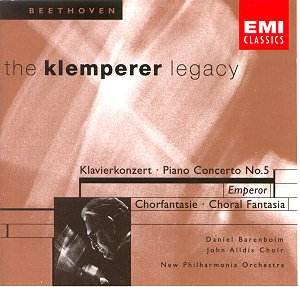BEETHOVEN Piano
Concerto No. 5; Choral Fantasia.
 Daniel Barenboim
(piano), John Alldis Choir, New Philharmonia Orchestra/Klemperer
Daniel Barenboim
(piano), John Alldis Choir, New Philharmonia Orchestra/Klemperer
 EMI Classics
7243 5 67329 2 6 64'06"
EMI Classics
7243 5 67329 2 6 64'06"
Amazon
UK Amazon
US

It has been a joy to renew acquaintance with Klemperer and Barenboim from
the 60's. I attended regularly Otto Klemperer's magisterial Beethoven
performances, and too the young Daniel Barenboim's complete sonatas
series at the new Queen Elizabeth Hall. The partnership in these 1967 recordings,
produced by the recently deceased Suvi Raj Grubb, is deeply satisfying and
the balance engineering of Robert Gooch plays no small part. Barenboim is
allowed to accompany the bassoon in the first movement of the Emperor, relaxing
and musing as he plays his figurations. All too often concerto recordings
are spoilt by the apparent desire of some soloists to be up front throughout
and a (misguided?) belief that this is what the public wants? I always approach
new concerto recordings by celebrity soloists with trepidation on that account.
Klemperer gives a sedate, unadorned tutti after the swirling piano arpeggios,
which get the first movement of the Emperor Concerto (1809) off to
a good start. It is rock-solid, like granite, calmly setting up the framework
for the interchanges which follow. Barenboim responds by playing it very
straight too. I don't have facilities (nor inclination!) for comparisons,
but the first movement takes 22'49" and gripped my attention unswervingly.
I don't own another Emperor, and this one is fine for me!
The Choral Fantasia (1808) provides a lot of Beethoven in microcosm,
and I once chose it to represent that composer in a Desert Island Discs type
competition, at a time when it was a concert rarity. It gives a glimpse into
Beethoven's improvisations (the opening solo piano fantasy was written down
after the first performance), then there are light chamber-music
variations on a theme close to the Ninth's Ode to Joy, gradually bringing
in different sections of the orchestra; finally the choir sings "- - lovely
is the sound of harmony - - accept the gifts of fair art gladly - -".
At the end, the piano joins in with octave scales and arpeggio flourishes,
which in this coupling lead nicely into the more elaborate arpeggiated flourishes
which call attention to the soloist at the beginning of the Emperor.
The digital remastering sounds fine to my (possibly not over-demanding) ears
and I recommend this reissue as an acquisition for any collection.
Reviewer
Peter Grahame Woolf


![]()